|
Contents
|
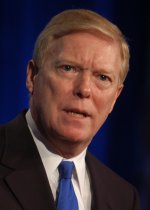 |
Dick Gephardt is the candidate who most deserves
to lead the fight over better health care, fair trade and Jobs Worth
Fighting For. No other politician can match his decades-long record as a
rock-steady supporter of working families on these three critical
issues.
"This election needs to be about choices - big choices," says
Gephardt. And no candidate offers a starker contrast to the policy
choices of the current administration. On health care, Gephardt has
promised to dissolve the Bush tax cuts to provide universal health care
for all Americans. On trade, he calls for tough sanctions against
foreign governments that violate human rights, labor rights and
environmental standards.
A long-time Congressional ally of labor unions and working families,
Gephardt promises to roll back NAFTA, block the FTAA and give U.S.
workers the voice in the White House that has been missing for so long.
|
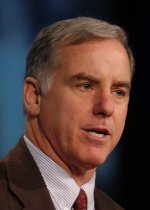 |
Howard Dean is the closest thing to a political rock star in
the 2004 presidential campaign. Surging in polls and out-fundraising his
opponents, Dean heads for Iowa and New Hampshire with a lead in both
states.
The physician turned politician gained early support with a strong
stance against the war in Iraq and stoked his lead with the claim that
he would make fair trade policies and job creation a top priority of his
administration. An ambitious health care plan is another campaign
promise, with insurance coverage available for every American at a
projected cost of $88.3 billion annually. The winner of the first Paul
Wellstone Award for "Support of Workers' Freedom to Form Unions," Dean
also endorses changes to federal labor law to allow 'card check'
certification and new civil penalties for companies that fail to bargain
in good faith.
|
 |
John Kerry's record as a decorated veteran of the Viet Nam war places
him in a strong position to cross swords with George W. Bush's over
foreign policy. Strongly opposed to the President's economic policies as
well, Kerry made a bold promise to replace every job lost in the Bush
economy during the first 500 days of his administration. On the red-hot
issue of health care, Kerry claims his administration would implement
plans to greatly expand the Medicaid program and allow Americans access
to the same health care system available to members of Congress.
As part of his plan to revitalize the U.S. economy, Kerry proposes $1
billion a year in manufacturing conversion incentives to retrain workers
and help factories convert their facilities in order to launch a fleet
of energy efficient automobiles.
|
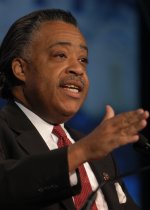 |
Al Sharpton's charisma and controversial
background assure the long-time community activist of media
coverage. On the campaign trail, a quick wit often takes the place
of position papers. When asked about Bush's tax cut, Sharpton
replied, "It's like Jim Jones giving you Kool-Aid, it tastes good,
but it will kill you." Arriving late at the AFL-CIO candidates'
forum in Chicago, Sharpton brought the crowd to their feet saying
he had a non-union cab driver. Sharpton supports a single payer
health plan and he proposes constitutional amendments that
guarantee health care, education and employment with the right to
organize collectively.
As part of his economic platform, Sharpton says he would only support
international trade agreements that include labor, environmental and
human rights standards.
|
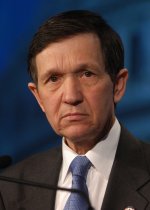 |
Dennis Kucinich needs more than the endorsement of Willie
Nelson and other celebrities to overcome his name recognition problem
with voters outside Ohio. But it's not that he isn't trying. The frenetic campaigner is calling
for a national health care plan that would eliminate the role of private
insurers. To pay for the plan, Kucinich would impose a 7.7 percent tax
on public and private employers, which he says would be less than they
pay now.
To rebuild the economy and stimulate job growth, the Ohio Congressman
proposes massive public works programs similar to Franklin Roosevelt's
New Deal. "Where the private sector fails to provide jobs, the public
sector has a moral responsibility to do so."
On the subject of international trade agreements, Kucinich is equally
blunt:"Free trade has been a disaster for our economy." Kucinich
promises to repeal NAFTA, block the FTAA and withdraw from the WTO.
|
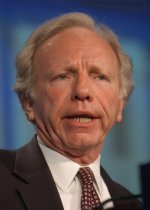 |
Sen. Joseph Lieberman believes his appeal to moderates in both
parties offers the best chance to win the White House. A strong supporter of free trade, Lieberman's positions are clearly
centrist, typified by his reluctance to reject the Bush tax cuts
outright and his refusal to embrace sweeping health care reform.
Lieberman claims to be fiscally responsible, tough on crime, and strong
on defense. His economic platform includes a range of tax incentives to
stimulate the economy, including a 20 percent Investment Tax Credit.
Lieberman would also end tariffs on high-tech products and make
cyberspace a "duty-free zone."
Senator Lieberman's healthcare proposal differs from his rivals in
size and focus. He claims his is the only plan that would cover all
children who have no benefits and continue that coverage until they
reach age 25.
|
 |
Carol Moseley Braun is the only woman running for president in
2004. The only candidate with experience as a diplomat, she describes
herself as a "fiscal conservative who fights for social justice."
Braun's campaign centerpiece is a single-payer system of health
insurance with costs shifted from the payroll tax to the income tax.
Recently endorsed by the National Organization for Women and the
National Women's Political Caucus, Braun expressed confidence that her
flagging campaign has yet to take off.
Calling for large federal investment in schools and urban
infrastructure as a way to stimulate jobs and the economy, Braun also
believes investment in the environment and alternative energy can
trigger large-scale job creation.
|
 |
Wesley K. Clark, a retired four-star general, swelled the
democratic field of presidential hopefuls to 10 when he joined the race
on Sept. 17. The former Rhodes scholar, NATO commander and occasional
CNN commentator says the #1 issue facing the country today is job
creation. "The President won't change his policies, so we have to change
the President," declared Clark, who unveiled a $100 billion program of
business tax rebates and increased federal aid to states and cities as
key ingredients of his job creation plan. Clark proposes similar aid for
local governments to ease the health care crisis and tax incentives for
business to stem the transfer of jobs to low wage overseas locations.
|
| |
Sen. John Edwards, a former trial attorney and Senator from
North Carolina, was among the first to informally declare his desire to
win the Democratic nomination for President. As part of his economic
platform, Edwards is promoting tax breaks for companies that create new
jobs in hard-hit areas and sanctions against those that move their jobs
and headquarters overseas.
Edwards is also calling for a $10 million investment to improve the
quality of medical care in small towns and rural areas. His
'telemedicine' proposal would provide equipment to give patients and
rural hospitals access to sophisticated procedures not currently
available.
The son of union parents, Edwards supports an expanded Family Medical
Leave Act and labor law reform, including 'card check' recognition and
penalties for corporations that violate workers' rights.
|
 |
President George Bush's economists agree, tax and trade
policies are key factors in the loss of nearly 3 million U.S. jobs and
that key sectors of the economy, specifically manufacturing, may never
recover. An unwavering ally of the health insurance industry, Bush's response
to the crisis of 40 million uninsured Americans has been to defend the
"right" of insurance companies to compete in a marketplace with as
little regulation or oversight as possible.
As a second term president, George Bush could be expected to continue
his efforts to block workplace health and safety initiatives while
working to eviscerate long standing labor laws that protect collective
bargaining and the right to overtime pay.
Additionally, the prospect exists for up to four new Supreme Court
justices being appointed by this highly conservative ideologue.
|

|